#homestuck analysis
Text
Sburb's Missing Texture
One thing that can cause a game to crash is a missing file. If an enemy or location is supposed to load an image for its texture and that file is damaged or missing, the game might crash.
One way games prevent that is to set a default "error" or "missing" texture, so that the object in question will look weird but the game will continue running.
Seeing as Sburb is a universe-encompassing game, you really, really don't want it to crash. So it would make sense to do this.
In which case, maybe you could see this 'missing' texture in...
Basic objects to which no texture has been applied,
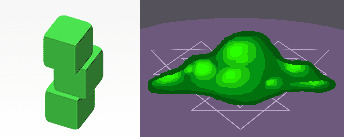
entities from the game's barely-finished, glitched "solo player" mode,
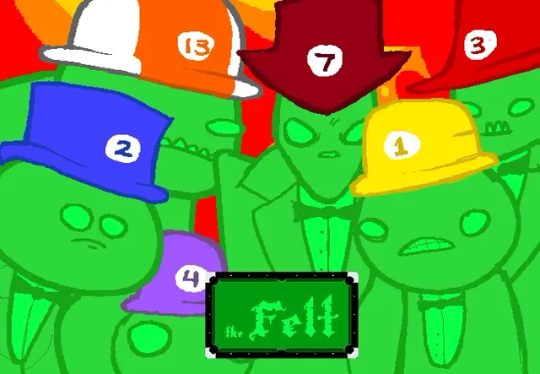
or in foreign objects that operate outside the game's normal rules.
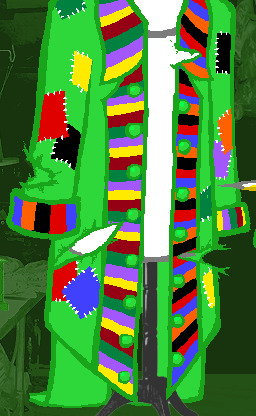
2K notes
·
View notes
Text
Daves ENTIRE PERSONALITY revolved around being just like Bro he never had the time to develop his own personality because from day ONE he wanted to be JUST like Bro he thought Bro was so cool to the point where he even ignored the abuse and just considered it normal, it's so common in abusive households for the abused kids to want to be JUST like their abusers because they've never seen like a normal household, and like most kids you tend to look up to your parents, which is what Dave was doing. Daves entire personality all his interests like everything were branched off from what Bro liked, he never got into things that Bro DIDNT like the only thing he didn't like was Bros puppets but dave wanted to be JUST like Bro he looked UP to him and people seem to completely ignore Bros abuse because of how dave reacted to it but ? what Bro does is still abuse and often when kids are introduced to abuse early in life they dont know that its abuse and they consider it normal which is why Dave reacted the way he did because he WASNT AWARE THAT IT WAS ABUSE WHICH IS NORMAL IN ABUSIVE HOUSEHOLDS AND ABUSED KIDS OFTEN THINK LIKE THAT which is why it comes off as such a SHOCK when you tell a kid they're being abused and whats going on isn’t normal and it seems like most of the fandom just ignores Daves abuse and everything and the fact that he never really developed his own personality until later on just because of the fact that he never really reacted or talked about it which annoys me SO badly I get its like hard to understand what abused kids are like and their bebehavior and stuff but!! you gotta understand like all his interests and everything came from Bro, his entire life until Sburb he wanted to be just like Bro he looked up to Bro so much to the point the abuse wasn't even something he considered abnormal because he thought Bro was just trying to help him be stronger and have a better reaction time or whatever but that's not what was going on and dave didn't know because he hadn't ever seen a normal household/this was his entire life this is what was normal to him so he considered it normal even compared to his friends lives, especially considering all the kids have semi abnormal lives other than john for the most part so dave was just convinced his life was normal because it was what he was used to and his friends also had odd home lives so he was just convinced that his life was the same gah I love Dave. I just think people should TRY and understand Dave’s character more, and it also just irks me how people see him as some flirty dude when thats not how he is, hes a wannabe cool-kid who has no idea how to behave and just mimics his Bros behavior!!! He WANTS TO BE JUST LIKE HIS BRO!!! HE SPENDS SO MUCH TIME TALKING ABOUT HOW COOL HE THINKS HIS BRO IS and you guys i swear he would NOT be a flirty little shit. He lives for bickering so he can come up with cool comebacks so people think “Wow this guy is REALLY fucking cool” when they're talking to him. So many of you guys seem to forget hes 13 in the beginning, his behavior is just a direct copy of how he saw Bro. He did not develop his own personality until later in life, and even then he still had a lot of Bros traits. Most kids dealing with abuse dont even know that its abuse until way late in life, because again, ITS ALL THEY KNOW!! If you lived your entire life not knowing what you were going through was abnormal, or even unhealthy, you would consider it as “the usual” WHICH IS WHY DAVE NEVER HAD A BIG REACTION TO IT, BECAUSE HE WAS SO USED TO IT. HE DIDNT KNOW IT WASNT NORMAL. Dave was a 13 year old boy dealing with an abusive father figure. From his interests to his personality, he just wanted to be like bro. that's all he wanted.
But, towards the end of his arc, we DO see him start to turn away from that desire to be like bro. We see him slowly realize, he isnt like bro. He doesnt want to be like bro. He isn't a "hero" like bro was, he doesnt WANT to be like bro was. But his entire childhood circled around being like bro, and it wasnt until bro died that he finally realized that wasn't what he wanted. But, as it wasn't until late in his life that he realized, he wasnt really able to form his own personality.
In conclusion: Dave is NOT some coolkid flirty boy, hes an abused child with no personality of his own. He is so much more than most of you guys let him be, and its so irritating to me.
#calamarichat#daveposting#dave strider#bro strider#homestuck dave#homestuck#dave rambling#homestuck rambles#dave understander#homestuck bro#homestuck analysis#dave strider analysis
531 notes
·
View notes
Text
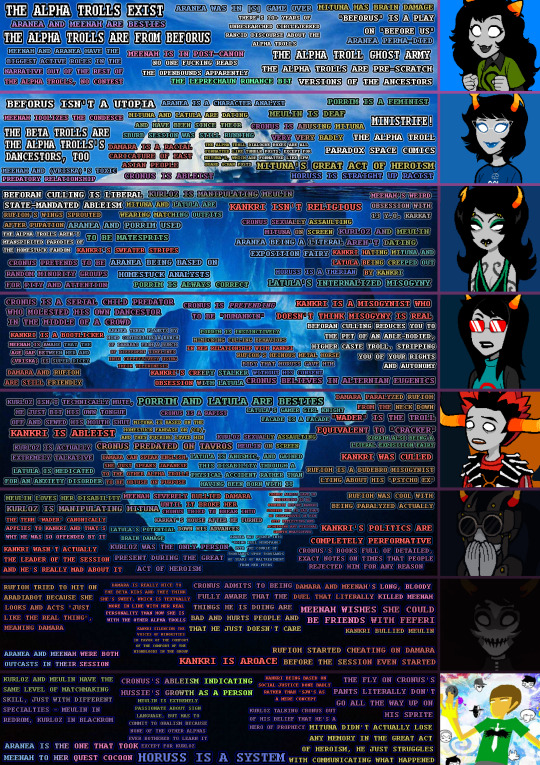
HAPPY 4/13!! Here's a partial Alpha Troll Lore Iceberg to celebrate, as asked for by fans and followers!!
All information in here is completely true, and this isn't even everything I could think of off the top of my head!! Have fun perusing, and I hope you learn a thing or two!!
#homestuck#homestuck meta#homestuck analysis#homestuck fandom#homestuck memes#alpha trolls#beforan trolls#dancestors#4/13#happy 4/13#lore iceberg#iceberg meme#cw abuse#cw assault#cw child harm#nekro.pdf#nekro.jpg#nekro.txt#icebergposting
545 notes
·
View notes
Text
The paradoxical nature of being a light player is either you are minimized and set into a pretty little box of zero relevance and mischaracterization or painted as an irredeemable bitch who should be punished for the crime of having self determination. The complexity that light players bring will forever set them in the minds of certain fans as either motherly and meant to be decoration in the background or destructive, meant to be destroyed for the enjoyment of simplicity and the men around them. I wonder what this could be a great metaphor for. I wonder why all the light players are women.
#rose Lalonde#vriska#Vriska serket#light player#homestuck#homestuck analysis#just a few things I noticed about homestuck fandom :)#just light player tings#aranea serket
1K notes
·
View notes
Note
I was thinking of the cherub adults; do you think they'd have aspects too? Or because they're before a session they don't?
I mean, the trolls ancestors also have aspects and they were before a session, so they could also potentially have one?
To me, everyone has an aspect.
Because aspects are the primordial components of the universe in Homestuck, so I think everyone is born tuned to one specific aspect, regardless of if they’re born inside the game or not, destined to play it or not.

The kids and trolls were meant to play it, they were created for it, but Calliope and Caliborn weren't and weren't supposed to play.
Cherubs being a super powerful being of legend aside, they were simple mortals unconnected to Sburb, but they still played it, the game let them have a session and they had classpects. The strongest posible classpects no less.

Another good example are the extended zodiac signs. They tell us the aspect and lunar sway of random trolls, even tho they will never play the game. People are just born with an aspect
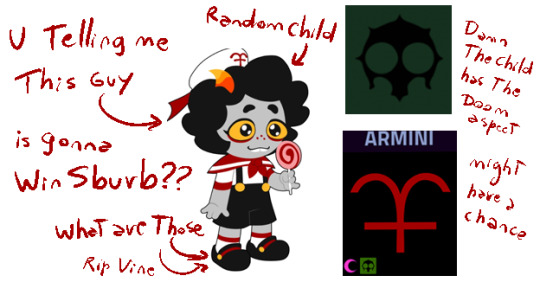
The only people I believe are born without a classpect are carapace, consorts and leprechauns, because they were created by the game itself to fulfill a role in it, so it would make no sense for the game mechanics to give them a player classpect.
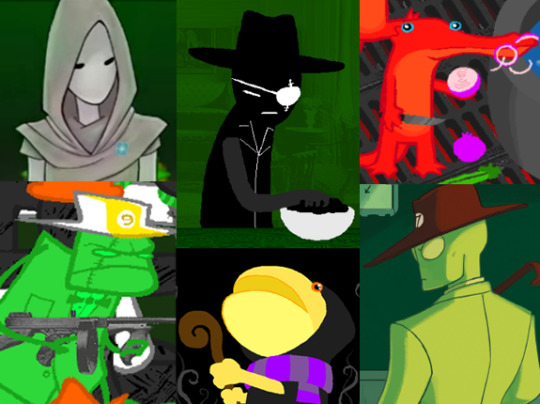
They themselves are already a part of the universe creation.
The same way Players can’t use the Queen’s ring, because its purpose is to be used by a carapace

So yeah, They could be time and space, like with trolls and their descendants or they could have ony other aspects, but Calamity and Calmasis should have aspects, simply because they’re mortals, born inside a Sburb-created universe, in which everyone is tuned to an aspect. (According to the Skaianet files, Calamity was born on universe B1, the beta kids original universe, while Calmasis was born on C1 the EarthC universe)

#homestuck cosplay#hs#homestuck calamity#homestuck calmasis#homestuck analysis#homesruck classpect#homestuck cherubs
234 notes
·
View notes
Text
I made a relationship chart from the standpoint of dirkjohn and how insanely funny it is, but fucked up for everyone involved.
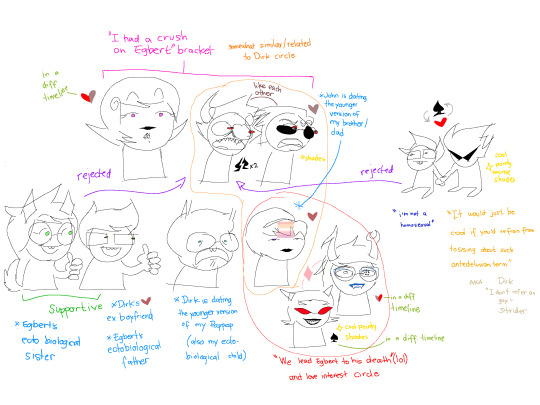
(I forgot to add that Ultimate Dirk also lead John to his death in hs^2. head in hands)
#rose projects her lesbianism through her mind's eye#homestuck#dirkjohn#johndirk#dirk strider#john egbert#dave strider#karkat vantas#jade harley#jake english#jane crocker#rose lalonde#roxy lalonde#vriska serket#terezi pyrope#vrisrezi#davekat#hs analysis#homestuck analysis#yeah#hs meta#mine#im still crying over this becaise i made this in an hour and im seeing mistakes you cant#<- edit sept: bitch you forgor#oh no i remembered actually. its that rose was just a suggestion to be married to. not a love interest lol#500plus
902 notes
·
View notes
Text
Classpect Analysis Definitions Guide Combob
i read a Smashing aspect analysis by @/alicesonions (which this is very inspired by check it out right now the redesigned symbols are awesome) and wanted to revamp my own so here we go shaggy 2 dope classpect guide 2.0 (og draft here)
this is just a rundown on how i personally understand/use classpects even though i love talking my ass off and want to over explain all this i tried to write hopefully easily digestible and to the point definitions using key words and phrases bc thats how i personally learn things (i might make an extended version with further information and analysis later)
this can always be edited too i am So open to discussion criticism etc please tell me every single one of your thoughts about classpects in tags comments whatever I LOVE HEARING IT
anyway fat megapost ahead man the cannons
- - >
Classpects
A “Classpect” is a player’s title in Sburb, which uses the formula [Class] of [Aspect]. Not only does a Classpect dictate a player's reality-bending powers, but it defines a player’s place in their session, their place in reality, and their place within the narrative itself.
There are two components that make up a player's Classpect: their aspect and their class. There are 12 aspects and 14 classes in total. Hypothetically, ANY player could be ANY of the 168 total combos of these, no matter the person, but Sburb will narrow down the options and pick a player’s Classpect depending on how it thinks it can BEST use them in the game/their specific session.
A Classpect is chosen via a sort of “sorting hat” method. The person you are (struggles, goals, gaming strategies, how you interact with the world and others, etc.) inadvertently dictates your Classpect, but that is only BEFORE THE GAME STARTS. Once you’ve entered Sburb, Skaia will ultimately decide your role based on everything it gathered, and you are stuck with it whether you like it or not.
[In total: Classpects are a predetermined in-game role to fulfill as well as a narrative tool.]
Aspects
Aspects are described as “the basic building blocks of everything that exists within paradox space”; a cosmic property that relates MOST to a player and that they have the potential to BEST excel at.
A player’s aspect is always something the player starts out STRUGGLING with in some way. No one ever has total control or knowledge of their aspect right off the bat. It is something that challenges the player and must be learned over time so the player can grow and reach their full potential as a Hero of their aspect.
Aspects are a neutral and nuanced concept- no aspect is inherently good nor bad.
The 12 aspects: Breath, Light, Time, Space, Life, Hope, Void, Heart, Blood, Mind, Doom, and Rage.
Breath: The aspect of freedom and detachment. Breath is impossible to hold down, easy breezy, head in the clouds, go with the flow. Breath is breeze, movement, flight, weightlessness, indirection, and independence. Breath blows whatever way it feels like, not caring about much else.
Narrative connection: Plot development.
Breath’s opposing aspect is Blood.
Light: The aspect of knowledge and illumination. Light exposes the hidden, brightens the dark corners, brings things into the spotlight. Light is relevance, illumination, luck, enlightenment, sight, visibility, definition, and attention. Light brings itself to what is hidden in the dark.
Narrative connection: Plot relevance.
Lights opposing aspect is Void.
Time: The aspect of rhythm and destruction. Time is connected to death, the past and future, taking action, small details, the destination over the journey. Time is repetition, iteration, cycles, pace, patterns, preservation, decay, continuity, and management. Time is the steady tick of a clock, the constant rotation of an ever-turning gear.
Narrative connection: Pacing.
Times opposing aspect is Space.
[Time is one of the fundamental fabrics making up paradox space and is therefore an aspect required to win Sburb. If your session does not have a Time player, your session is doomed to fail.]
Space: The aspect of creation and beginnings. Space is new things, focused on the wait-and-see, the big picture, the here-and-now, the journey over the destination. Space is destiny, matter, physics, making, innovation, and intuition. Space is a vast endless infinity of possibility.
Narrative connection: Setting.
Spaces opposing aspect is Time.
[Space is one of the fundamental fabrics making up paradox space and is therefore an aspect required to win Sburb. If your session does not have a Space player, your session is doomed to fail.]
Life: The aspect of agency and autonomy. Life is foraging your own path, own destiny, self-direction, growing and strengthening. Life is nature, health, resilience, energy, progress, healing, vitality, and nourishment. Life sees its route and fights to take it.
Narrative connection: Agency/action.
Life’s opposing aspect is Doom.
Hope: The aspect of belief. Hope is dreams and wishes, blind optimism, unstoppable force, the "there’s always a way, nothings impossible". Hope is faith, possibility, positivity, will, imagination, and determination. Hope is a clear, enthusiastic "YES!".
Narrative connection: Convenience.
Hopes opposing aspect is Rage.
Void: The aspect of nothingness and the unknown. Void is a blank canvas, an empty page, a dark corner, a shadow concealing darkness. Void is secrets, mystery, invisibility, unexplained, ignorance, irrelevance, and uncertainty. Void obscures what the light can't reach.
Narrative connection: Plot irrelevance.
Voids opposing aspect is Light.
Heart: The aspect of feeling and self. Heart is the core of a person, their identity, passions and interests, the soul, feelings instead of thoughts. Heart is motivation, love, emotions, uniqueness, personal, individualism, bias, and passion. Heart follows itself.
Narrative connection: Inner self.
Hearts opposing aspect is Mind.
Blood: The aspect of unity. Blood is down to earth, grounded and chained, has expectations, forms relationships. Blood is community, responsibility, care, effort, stability, obligation, and connection. Blood is running through everyone's veins and knows it.
Narrative connection: Character dynamics.
Blood’s opposing aspect is Breath.
Mind: The aspect of thought. Mind is unbiased decision making, apathy, black and white, blends in with the crowd. Mind is equality, ration, logic, reason, judgement, calculation, choice, balance, and justification. Mind pushes away feelings and thinks instead.
Narrative connection: Outer self.
Minds opposing aspect is Heart.
Doom: The aspect of fate and constraint. Doom works within the rules, within restriction, follows damands. Doom is burdens, prophecy, acceptance, necessity, limitation, punishment, and misfortune. Doom does not negotiate against the inevitable.
Narrative connection: Conflict.
Doom’s opposing aspect is Life.
Rage: The aspect of refusal and rebellion. Rage is the ugly truth, holding back, immovable object, being stuck, “it’s impossible, there’s no way out”. Rage is cynicism, defiance, fury, negativity, anger, riot and revenge. Rage is a loud, guttural “NO!”.
Narrative connection: Contrivance.
Rage’s opposing aspect is Hope.
Classes
Classes are the second ingredient of the Classpect formula. Since an aspect is a cosmic property that relates most to a player, a class is how that player USES/INTERACTS with that cosmic property & its powers. Classes are NOT something a player struggles with and are just dictated by how they approach/play the game.
Classes are a neutral and nuanced concept- no class is a “worse/better” or “evolved” version of another, no class is gender locked, and no class is inherently good nor bad.
There are six functions of classes: creation, destruction, exploitation, manipulation, knowledge, and relocation.
[Creation: Bringing something into existence.
Destruction: Taking something out of existence.
Exploitation: Having something and using it.
Manipulation: Changing or altering something.
Knowledge: Knowing all about something.
Relocation: Stealing and/or moving something.]
The 14 classes: Heir, Seer, Knight, Witch, Maid, Page, Rogue, Prince, Mage, Sylph, Thief, and Bard, and the two master classes: Lord and Muse.
Heir: One who changes with their aspect or is changed through their aspect. Heirs inherit their aspect and can greatly use it for their session and coplayers.
Class function: Manipulation.
Heirs' counterpart class is Witch.
Seer: One who knows their aspect or knows through their aspect. Seers are knowledge-seekers who obtain information by observing, and guide their coplayers using what they learn.
Class function: Knowledge.
Seer's counterpart class is Mage.
Knight: One who fights for/protects their aspect or fights/protects using their aspect. Knights are set on serving and defending their session and coplayers, using their persona as a shield and their aspect as a weapon.
Class function: Exploitation.
Knight's counterpart class is Page.
Witch: One who alters/bends their aspect or alters/bends using their aspect. Witches utilize their powers to bend the rules and test the limits of their aspect and session itself.
Class function: Manipulation.
Witch's counterpart class is Heir.
Maid: One who serves/repairs their aspect or serves/repairs with their aspect. Maids clean, preserve, and maintain their session with/and their aspect, just as a housekeeper would.
Class function: Creation.
Maid's counterpart class is Sylph.
Page: One who strengthens their aspect or finds themselves through their aspect. Pages start out as weaker underdogs, but once their potential is fully realized, they can use their power to an astounding degree.
Class function: Exploitation.
Page's counterpart class is Knight.
Rogue: One who steals their aspect or steals from their aspect to provide others with it. Rouges take from their aspect and redistribute what they steal to their coplayers Robin Hood style.
Class function: Relocation.
Rouge's counterpart class is Thief.
Prince: One who destroys their aspect or destroys with their aspect. Princes are powerful, blunt forces in their session who once fully realized, will stop at nothing until they reach their goal.
Class function: Destruction.
Prince's counterpart class is Bard.
Mage: One who understands their aspect or understands through their aspect. Mages are the experiencers of their aspect that utilize their experience with it to guide themselves.
Class function: Knowledge.
Mage's counterpart class is Seer.
Thief: One who steals their aspect or steals from their aspect to keep themselves. Thieves are focused on taking from their session and others in it, then keeping that power for their own benefit.
Class function: Relocation.
Thief's counterpart class is Rogue.
Sylph: One who heals/mends their aspect or heals/mends using their aspect. Sylphs are vastly supportive to their coplayers through both backstage influence and personal interference.
Class function: Creation.
Sylph's counterpart class is Maid.
Bard: One who allows the destruction of their aspect or invites destruction through their aspect. Bards can be kind of a wildcard for their session, possibly for the best (or the worst).
Class function: Destruction.
Bard's counterpart class is Prince.
Master Classes
Lord: One who rules their aspect or rules using their aspect. Lords are intensely powerful domineers who command their aspect, session, and everything in it to bow down to them.
Lord's counterpart class is Muse.
Muse: One who inspires their aspect or inspires through their aspect. Muses are completely in tune with their aspect and influence their session with it, leading it like a conductor with their baton.
Muse's counterpart class is Lord.
267 notes
·
View notes
Text
A HOMESTUCK MANIFESTO
I want to think about what comes next after Homestuck.
That’s a challenge to the world as much as a personal mission statement.
I want to see writers and artists and creators making the next Homestuck, taking its themes and binding them into new fabrics, giving life to new creatures even more beautiful and uncanny than the original species.
I hunger to see new forms of story and image evolving with Homestuck in their DNA.
This process is already underway. Homestuck is a massive boulder dropped into the waters of culture, and the full wake of its ripples is still to be felt. But let’s call attention to this process and ask: what would happen if we engaged in it more consciously? If we sifted through our feelings about Homestuck to create something new, deliberately, with great and wonderful purpose?
The tools we need are within our grasp. Homestuck presents itself as magic, but it’s a work constructed in time out of specific storytelling choices. So let’s understand those choices. Let’s understand how Homestuck did what it did, and use Homestuck’s tools to build art that grips the soul of future generations as strongly as Homestuck did ours.
What follows is not a traditional literary analysis. It does not cite its sources; it does not seek to give us a comprehensive understanding of Homestuck. If it does, it does so only to the extent it suits its larger purpose.
Our goal here, our quest, if you will, is not to understand the Homestuck that exists, but the Homestuck that comes next.
Let's begin.
0. THE WILD GARDEN
Let’s lay the absolute groundwork here.
Homestuck is constructed as a re-appropriation of itself. Or to put it another way, it’s a big improvisational move, a process of “yes and”-ing so hard it develops a sprawling continuity.
Tiny details are constantly re-contextualized to become part of something else. A joke might turn tragic. A silly aside might turn into something profound.
But it didn’t have to be that way.
It’s crucial to understand that what we experience as continuities were in fact choices made at specific times. Homestuck is a garden where seeds were scattered in every direction, grown en masse, then weeded down to create patterns and forms.
The shape of the garden is designed to conceal the gardener’s hand. But the gardener’s choices are there, every step of the way.
If we are to follow in its footsteps, what choices should we make?
Let’s talk about themes.
1. THE MEANING CRISIS
Nobody in Homestuck knows what they’re doing.
And neither do we.
All the old idols have broken down. The values we were taught in our childhood fail to measure up to the problems of the world we live in. We grasp after careers and lives we were told would make us happy and wonder why we’re left empty. The selves that we were told were us now fit us about as well as clothing we’ve outgrown. Crises loom, political, economic and environmental, and everywhere it feels like the people who are supposed to guide and lead us aren’t doing enough.
It's widening gyres and slouching beasts all the way from here to Bethlehem, is what I’m saying.
The reason people go absolutely insane for Homestuck is that it depicts this crisis of meaning. It shows the questions we might want to ask, and attempts to provide some kind of answer.
The protagonists of Homestuck struggle with what I’ve called “received narrative.” That is, they’ve inherited stories from their families, from the world, that they try to use to define their lives, and it doesn’t work. But these stories are so familiar that it’s hard to think outside them. They have to develop new stories by which to live. Sometimes they succeed, but other times they can’t escape the gravity of the ones they were given.
With me so far?
Great. Now understand that all this was improvised and discovered largely accidentally over the course of ten years.
Here’s a seed that became quite an impressive tree:
The streets are empty. Wind skims the voids keeping neighbors apart, as if grazing the hollow of a cut reed, or say, a plundered mailbox. A familiar note is produced. It's the one Desolation plays to keep its instrument in tune.
It’s a joke. But it was never just a joke. There’s an idea here of dissatisfaction with the stereotypical idea of American suburban life. Egbert here is looking for something more, dissatisfied for reasons they can’t fully articulate. This is typical fantasy protagonist stuff, but there’s something more here, too.
Eventually it’s redirected towards the idea that there really is an unseen riddler. But let’s put that aside for now.
This page, in its moment, says: your life is not the full picture. There’s something else out there, waiting, that’s going to change everything.
That's a potential set-up for a very powerful payoff. It gives us the sense that Egbert and all their friends are going to have to rethink what they know. That this suburban life is not going to be enough for them, that somehow or other they’re going to encounter something they aren’t prepared for, and they’ll have to find a new way of acting and being. That, try as they might to avoid it, they’re going to change over the course of this journey.
But to understand how they change, we need to talk about SBURB.
2. THE PORTAL FANTASY OF IT ALL
A lot of people like to joke that Homestuck is an isekai. I think it might clarify things to use the term portal fantasy instead.
Portal fantasy is simply the fantasy subgenre of characters, usually kids, going to a magical other world. Maybe they make friends, maybe they learn lessons and stuff. You know the drill. I don’t have to to tell you more because the story structure is already so familiar. That’s what gives it power.
Portal fantasy differs from the related Japanese genre of isekai in that isekai in its current form is much more heavily based on video games such as MMORPGs. In the most pervasive isekai narratives, protagonists are rewarded not so much for achieving personal growth as being able to exploit the game mechanics of a game-like system. That’s pretty different from your typical Narnia scenario.
The influence of portal fantasy is everywhere in Homestuck, especially in the beginning. We have nods to the fantasy films of the 1980s that gave us our contemporary idea of this story structure, such as The Neverending Story (itself, in its original book incarnation, a phenomenal commentary on the genre). Our protagonists are genre savvy; they recognize what’s happening here.
But it doesn’t fit quite right. The odd note is first sounded when Egbert asks Nanasprite if what they’re doing is going to save the world. They’re bit unsettled to learn the answer’s no, that something else is going on here. Next we have the fantasy worlds: the planetary lands each present a veneer of exciting adventure. But their inhabitants, the consorts, aren’t fully-realized people, they’re largely cute animals going through the motions, not really understanding the story they’re telling. The carapacians are a little better, but they’re still trapped in a fatalism that feels uncomfortable.
As things rev up in Act 4, we learn about doomed timelines from alt-timeline Dave and Rose, how your entire existence in this setting may be fodder for something other than you. When we learn the true purpose of SBURB and its froggy details in Act 5, we see that SBURB is more like a biological creature, mainly interested in its own reproductive desires. It was never really about the portal fantasy at all. The kids are just along for the ride.
So when we see that Rose wants to tear through SBURB, find out a way to escape fate, and snatch meaning from the jaws of futility, it makes sense. We’ve been given hints already that this is the conflict at hand: the characters vs the story that’s telling them.
(Note: it’s certainly possible to have a reading that SBURB is not evil so much as empty, that it reflects what you bring into it, that its will for you is your will for you. But that’s also a difficult thing, right? If you lack self-understanding, it’s a struggle to bring about your ideal reality.)
What we haven’t mentioned yet is that this is all mediated through the lens of video games. Which makes perfect sense. Because where do we seek meaning, especially as kids? In imaginary worlds that make more sense to us than real life, that give us achievements to take pride in and clear objectives to pursue.
SBURB evokes mechanics from games like Final Fantasy. We see its players complete objectives, cast magic spells, gain power-ups with colorful costume changes. But unlike the narratives implied by traditional video game progressions, leveling up doesn’t mean you grow as a person or process your trauma. Later, in Act 6, when we meet a player who has made his life about winning the game (Caliborn), it’s horrific to behold.
Homestuck is a portal fantasy, but it’s fundamentally a portal fantasy about games. It’s a portal fantasy that shows us how characters seek meaning in being the best at arbitrary game mechanics, but ultimately fail to find it.
So I guess…it actually is an isekai? Huh. Wild.
(But seriously, Homestuck is actually fairly prescient in predicting the ideas that come out of isekai and LitRPG. It’s engaging consciously and deconstructively with the weird ideas of self-fulfillment these genres are drowning in.)
So what might a Homestuckian work look like? It will almost certainly critique a false narrative we live by. It may comment on portal fantasy, or our personal satisfaction that comes as easily as playing a video game. But it doesn’t have to be limited to these things. It might talk about our popular TV shows and movies. It may take apart what’s flawed in Marvel, the latest triple-A game, or the modern dark fantasy novel.
Among its tools will be discomfort. Showing a disconnect early on between our character’s expectations and their happiness can serve as foundation to build on, so that when the flaws of the genre narrative are revealed, it feels like the truth. We may see characters who accept their narratives passively, or rebels like Rose Lalonde, who chose to rip everything apart in search of something better.
These are only some of the possibilities.
When I tell you the stories we live by mislead us, what is your relationship to that? If you were to tear these received narratives apart, what would you focus on, what would you try to say? The art that comes out of this question will be deeply personal to the soul who makes it.
But here’s another question:
Just who is giving us all these narratives, anyway?
3. THE PARENT FLIP
The world we live in was not made by us. It was shaped by forces that predate us, over which we have no control and are born into the grasp of without the knowledge of how to escape.
For instance, our parents.
The guardians who raise us provide our template for how to interpret life. We spend a large part of our lives immersed in the world they built, believing as they believe, living by the values that they instruct us in, so that we might carry their goals forward to the future.
This is an effort that is certain to fail.
Because the problems of today aren’t the problems of twenty or thirty years ago. At best, their messages can only to help in a limited way with the crises we go through as we live our lives. At worst, they actively hinder us from dealing with them productively.
If we are to escape the broken patterns of our world, then we need break out of the stories an earlier generation gave us.
How are parents discussed in Homestuck?
Initially? As jokes.
If we take our “future knowledge” goggles off for a moment, we can see that the early depictions of the kids’ parents are a goofy parody of standard parental tropes. Mom and Dad are nameless, faceless, exaggerated cartoon stereotypes, and conflict between them and their children is initially expressed through a silly video game fight.
There’s a seed of something real here, though. What we’re parodying is a familiar trope of tension between parents and children in kids’ fiction and YA fiction. But that trope exists for a reason. This conflict is rich with potential for any story about growing up. And Homestuck has smuggled the idea of it in as a silly RPG parody.
So we can extrapolate, for instance, that there’s tension between Egbert and their father in part because Egbert doesn’t know yet who they want to be, and that Rose and Mom’s relationship is awkward and contentious, with alcohol involved. We see that there’s something profoundly uncomfortable going on between Dave and his Bro, and Jade’s life in the shadow of a dead Grandpa suggests a psychology that’s not entirely a healthy one.
Understand that I’m not saying that all this was there from the start. Rather, a choice was made to develop these interesting possibilities out of the jokes, to tell a story about how parents that act like these ones might have affected their children.
A major turning point in this regard is when Egbert learns their father’s seeming clown obsession was the result of a failed attempt to connect with them. It’s quite silly, but it plays around with the idea of a gap in perception between parent and child. It’s also a sign the story’s starting to take more of an interest in character psychology, suggesting that what Egbert processes consciously is not the same as their deeper unconscious feelings. This in turn can become a setup for a portrait of Egbert as someone who represses things they don’t want to think about. From this moment, in the long term, comes June Egbert.
When the psychology machine revs up for all the characters in Act 4 and Act 5, it’s able to do so because this foundation was laid.
We also, as early as Act 3, get hints that the parents have intentions and personalities outside of how the kids perceive them. The original purpose is to hint at a larger conspiracy around SBURB, with Mom building a secret lab, Dad trying to investigate the mystery, and Grandpa jumping in and out of time. But what this suggests is that the psychology of the parents might at some point come into play.
But the most exciting development in the relationship between parents and children is Act 6.
The great role reversal. The parent and child flip.
How do you make your faceless parent figures into characters?
By making them kids.
We’re so used to this concept now t that it’s hard to remember how wild it is that Roxy is a teen version of a main character's mom. But the concept is genius. Meeting these characters on the same level forces our protagonists to understand them as people and reflect on their fallibility.
For us as readers, it adds detail and nuance to the cartoonish portraits we got in the beginning. Conversely, we also see what our protagonists might have been like as parents themselves—and turns it from a story of “parents just don’t understand” to a story of how people, despite their best intentions, can wound each other.
(The Homestuck Epilogues are a difficult text to evaluate, but one of the best things within them is Egbert’s arc in Candy, where we see how Egbert might have done as a parent, how their struggles with finding purpose in the world might lead them to embrace a narrative of parenthood yet struggle to have a good relationship their kid. It’s brilliant, and the culmination of everything we’ve talked about here.)
Thus the Homestuckian work of art will be concerned with themes of parents and children. It will play with the boundary between what children understand about their parents and what they don’t. It will show parents as people—fallible people, who make mistakes with severe costs, whose stories fail their children and themselves. It may build from a simple base of what children understand, or it may weave parent and child perspectives together. It may even show us how children fail when they become parents themselves. It will show us the cycles we are trapped in, how we wound and are wounded by our context.
And it will force us to look for a way out.
4. CLASSPECTS AS SIGNPOSTS
Hey. You want to know a secret?
Come closer, and I’ll whisper it to you.
Classpects aren’t actually all that complicated. Ultimately, they boil down to one thing:
Symbols we can use to construct a self.
If Homestuck is about a crisis of meaning, then classpects are part of its answer.
What do we do, when the world gives us no story we can live by?
We make one. We make one out of whatever symbols and messages we can find and put together from the stories we’ve read, from the people who teach and inspire us. Such collages are powerful things. They give us a way out of the dark, they give us a sense of something we are and can be, where there was nothing before.
They give us, in short, a personal mythology.
Classes and Aspects have often been read as codes to be unpacked and solved. It might be more productive to see them as creative tools, signposts designed not to narrow down meaning, but to allow us to explore it.
For instance, the portrayal of Light in Homestuck is unique. As a symbol, it combines notions of brightness, knowledge, future, luck, wealth, and narrative focus. These things aren’t inherently linked out in the world, but they are here, and that’s a choice, and an interesting one. It encourages us to imagine connections between these concepts, and to see if they have any relevance to ourselves. Identifying with the concept of Light, in other words choosing to value clarity, luck, and importance, might be a powerful tool for finding one’s way in the world.
Classes play with signposts at an even more basic level. Sure, we can talk about what a Knight does in the context of the story.
But a knight is already a powerful symbol. We bring so much cultural context to it. The word conjures up images and narratives of devotion, duty, violence, the slaying of dragons, armoring oneself against the world, and the rescuing of princesses. If we put that together with a concept like Time, we get a distinct character. If we put that together with our own experience of the world, we can create powerful concepts for who we want to be.
Interestingly, this complicates what we said about SBURB. As much as our protagonists struggle to find meaning within it, there’s still something there that they can latch onto. Classes, aspects, denizens, even consorts and lands—these things don’t have to be devoid of meaning. We can choose to affirm them; we can build something out of them, and say, yes, this is me, this is myself.
But it’s a double-edged sword.
We are responsible for the narratives we choose to live by. And we may find ourselves falling into a narrative that hinders us more than helps us, that creates a self-destructive self.
What does it mean to believe deeply that you are a thief, that taking from others to benefit yourself is the best way or comes to you the most naturally? What does it mean to tell yourself over and over that you’re a prince, with all the attendant baggage of power and grim responsibility that comes with that concept? Or, to follow the path further, what does it mean to tell yourself over and over that you are a destroyer or must be destroyed?
If we are to escape the story we’re trapped in, we must take care, lest we trap ourselves in a story of our own making.
Homestuck never quite resolves the ambiguity around these symbols of self, around whether SBURB hurts or helps, whether classpects are things you create or things that create you. But this ambiguity is a productive one. It gives us symbolic tools we can use in the creation of meaning, and it shows us the side of them that should make us wary.
The work that is to come after Homestuck will be about symbols. It may show us how we seek them in popular culture, or the people around us. It may use some of the clusters of meaning that that we see in Homestuck, but it will not be limited to them. It will write its own language of symbols, joining Light and Time to notions like Memory, Need, Rupture, and War, and be filled not just with knights and princes but brigadiers, lancers, healers, druids, taxidermists, sentries and waifs. It will build with tarot cards, enneagram types, and Babylonian gods. It will place all the signposts we’ve created in millennia of existence into new contexts and meanings.
By such means will it show us a way forward.
There’s one kind of symbol we haven’t talked about yet, however.
The kind that holds a mirror up to the world.
5. THE POWER OF ALTERNIA
There’s a reason dystopias have been so popular in young adult fiction. Sure, they’re cliché now, but they speak to something raw and visceral.
When you’re growing up into a world that doesn’t make sense, it’s natural to find refuge in emotional extremes. Stories of blood and violence, fates worse than death, and governments that demand horrific things of their citizens speak to the anxieties of the adolescent mind. They validate the feeling that something is wrong—that the world we’ve inherited is broken and unfair and has no place for us. And they’re right.
Alternia taps into these dystopian feelings perfectly. What makes it so fun is that it’s an inversion of a teenage fantasy. It’s a world where there are no parents, where kids can have access to power and violence, where you can sit around and play video games and design your own house. It almost feels like a response to the “parents don’t understand” themes of the early acts.
But the dystopia’s there, and it’s sneaky. A land of lost boys and girls isn’t actually all that great to live in. It’s lawless, survival of the fittest, with children killing each other left and right. And the future adult roles most of the troll kids aspire to are a glamorous veneer over competition for slots in a fascist military hierarchy. Which is to say nothing of the blood caste system as a way in which the kids are taught by their world to abuse and exploit each other. Crushes, personal slights, competition for status, group dynamics, attempts to define identity – all these familiar teenage dynamics play out on a backdrop of maiming and murder.
Which is perfect. Because when you’re young, all those social interactions genuinely do feel like life or death, and adulthood a regime of exploitation and horror bearing down on you. Alternia is a heightened, exaggerated version of reality. It expresses an emotional truth, not a literal one, validating our most intense feelings and giving us a road map to understanding them.
No wonder so many people wanted to skip to Act 5 and get to the trolls.
(See also Hiveswap Friendsim and Pesterquest, which explore these themes really really well.)
And Alternia, for a world where parents aren’t really a thing, tells us a surprising amount about the parental generation. In mid Act 5-2, Ancestors are added to Alternia’s wordbuilding, and we learn that as much as the trolls skipped having traditional parental figures, they were never devoid of role models. The deeds and exploits of notable figures throughout ancient Alternia gave them models to think about each other and themselves—even when those models were toxic ones. In a way, this isn’t so far from the human kids at all.
Furthermore, as time goes on, we acquire an origin for Alternia’s fascist worldview. Doc Scratch, manipulator of society, stands in for all those aspects of the world that work to create the false narratives we are born into, a true evil father figure – or uncle, if you prefer. And he's an extension of the ultimate evil father figure, Lord English, who controls not just Alternia but the timelines of the human children as well, whose belligerence and apathy give us aeons of toxic narratives and abuse. We see that story played out in Alternia in every interaction, in every moment, the beliefs its architects live by.
This is the power of dystopia—it can hold a broken mirror up to the world we live in.
Therefore the Homestuck that will come after Homestuck will worldbuild gardens of horror. It will not pull its punches but show us insidious societal systems and the effect they have on the people who live under them. It may depict fascism, authoritarianism, feudalistic tyranny, or all three. It will be unafraid to evoke blood and guts but use them to paint a picture of what we want, what we fear, and how we break under our false horizons.
As it depicts the path out, so, too, will it have its reverse side—it will show us all the hells and purgatories we’re trapped in.
6. SAILS TO THE WIND
Much has been written (including by this very author) about Homestuck’s metafictional aspects – the way it comes to foreground a more direct clash between character and narrative.
But the point I want to make here is that the metafictional angle wouldn’t work without these earlier choices. They allow the comic to talk about these concerns long before any notion of canon rears its head.
There are many ways of approaching these themes, and we don’t have to be limited to notions of Ultimate Selves and Beyond Canon to explore them. Such things are valuable, but they are only one retelling of the myth. If we are to make the next Homestuck, we must make our own.
I want to illustrate the space of possibility by offering some examples of works that explore similar themes. Note that I’m not saying these works were influenced by Homestuck in any way, but rather that they use some of the same tools to speak to the same questions, anxieties and concerns.
In trying to make what comes after Homestuck, we might consider:
Revolutionary Girl Utena, which foregrounds the archetype of the Prince as duelist, tyrant, and hero and dares its characters to break free from the false reality that shapes even these aspirations and dreams.
The Familiar by Mark Z. Danielewski, author of Houseof Leaves, whose core narrative concerns an twelve-year-old girl in thrall to an entity whose intentions are unclear but may be shaping the fabric of reality itself; which depicts the inner lives and uncertainties of her parents with just as much detail as they struggle, and sometimes fail, to make the right choices to help her; a story which, even in its incomplete form, explores a notion of a greater S.E.L.F that is not just you but also those who share something with you, where characters from other realities blur into transcendent archetypes in this one.
Digimon, perhaps the quintessential work of portal fantasy, not only Digimon Tamers, which steers the genre into a place of trauma, cosmic horror, and adults horrified by children saving the world, but also Digimon Adventure, which creates strong character arcs for eight very different children as they try to navigate a strange alien world, and shows us their struggle to reconcile with their parents as part of the process of understanding themselves.
The Neverending Story by Michael Ende,foundational text for Homestuck, which tells us not only about the rich possibilities inherent in reading oneself into fantasy worlds, but also the terrible potential for harm in making oneself an emperor over them.
Pale, by Wildbow, author of Worm, an urban fantasy story about three teenagers thrust into a world of magic and murder, a world where symbols literally create reality, where concepts like Carmine and Aurum have a powerful pull, where the Self is something that can be nourished or taken apart and put back together, a story where the parents are not just supporting cast but fully realized people forced to reckon with the ways in which they have deeply failed their children, and which contains perhaps the most thorough investigation of the question of “is it good for children to go on magical adventures?” ever committed to the page.
Heaven Will Be Mine, by Aevee Bee,in which the giant robots we pilot through space become the symbolic manifestation of our inner selves and our way of bringing about our ideal reality, and, relatedly, We Know the Devil, in which the repression of those selves causes them to burst out from us in terrifying and glorious new forms.
Crow Cillers, by Cate Wurtz, an often trauma-filled horror comic in which a group of kids and, eventually, adults, tries to fight back against an ever-present death cult that has its grips on every corner, all the while encountering Psyforms, beings made of pure mind, while characters from television and cartoons dance in the margins and all the while the line blurs between audience and art until it becomes difficult to tell who created who—a story that asks what it means to find meaning in stories when the corporate entities that own them are trying to devour us.
It's a tragically short list, I know. But perhaps it conveys some of the angles we might take.
We can also look at works that are known to have inspired by Homestuck. There aren’t many yet, but there are a few.
Undertale is famous for its Homestuck influences, with parallel timelines, an idea of agency that persists across them, and a contentious relationship between player and character, but for my part, I’m just as interested if not more so in Deltarune, which seems to be slowly building a grand thesis about portal fantasy, where the kids' adventures in the Dark Worlds seems to be offering them an escape and helping them become their best selves—but hints at a coming challenge to that simple worldview in the question of who’s really experiencing that escape.
The Locked Tomb, by Tamsin Muir – This is the big one, that really shows what building on Homestuckian themes can achieve. It turns out there really is an audience for weird aggro formalism in scifi publishing if you make it sufficiently gay. But smartly, like Homestuck, the Locked Tomb builds its weird mysteries gradually, adding on layer after layer on the solid foundation of characters we can follow and get invested in. There’s so much to notice – there’s the highly categorized teenagers involved in a murder feud, there’s the constant whiplash of humor and tragedy, there’s the endlessly open spaces in the story to interpret and project on to.
But to me, what stands out the most is the portrait of God and his court as every bit as emotionally chaotic as the sniping teenagers. You go to heaven, and God’s making out in the corner with his friend group, and you look for the adult in the room but the adults in the room don’t know what they’re doing and they never really did. It’s a portrait of the parents, it’s a portrait of the Ancestors, it’s a portrait of the gods of the new world, and it’s exquisite.
The Locked Tomb gives us a world at war with its own mythological narrative, rich with angst and irony. It’s a worthy successor to everything Homestuck was doing. It shows us how much these themes can say to us, and it gives us a hint at how powerful Homestuck's legacy might be.
7. THE APOTHEOSIS OF HOMESTUCK
There’s a lot of discussion about how to continue Homestuck. How to do it justice. What post-canon might look like, and what it might not. What fan comics, what fan fics, what semi-official works truly live up to the spirit of its characters and its multiverse.
To be clear, those discussions are awesome. I’m so glad those things exist, and it’s wonderful to see them unfolding.
But I don’t want the process to stop there. I'd be disappointed if it was only about adding to and re-articulating Homestuck itself.
I want this—
—This multifaceted, complicated, emotionally laden thing that is the experience of engaging with and creating with and interpreting Homestuck—
To go out into the world and to be infused into the world, to become waves spreading further and further. I want to experience the Homestuck artistic movement, the Homestuck school of thought. I want it to be an influence on the fiction of the coming generation of authors, and the next, and the next.
I want Homestuck to be one of those albums that's too obscure to be known by the general public, but everyone who listened to it went on to start an enormously successful band.
Homestuck can appear like a thing that was conjured out of the ether, but it isn’t. It’s a product of a particular time.
But that in itself is profound. When you create art, you reach back to all the things that have shaped you, and you listen to what the world around you needs, and you try to say what needs to be said. Which means you're a part of a history and culture that needs to say those things, which will be different from the things that needed to be told yesterday, and different from the stories that will be needed tomorrow.
There’s no otherworldliness to it, no platonic other reality. But for all I've talked about art being made of choices, there's still something transcendent here.
To make Homestuck—and to make art inspired by Homestuck—means being a node in a web formed of millions of people, where a light passes down the chain to you, and for the briefest of moments, you get to be filled with its presence, before it moves on to the next person in the chain.
That light isn't yours. Not really.
But at the same time, you do get to choose how that light manifests.
And to engage with that process consciously—to think deliberately about what we want to create—that gives us power and agency over that process, our sense of the world, and ourselves.
So let’s do this. Let’s make the thing that Homestuck is telling us can exist, the thing it’s paving the way for, the thing we know in our soul can come to be.
Let’s make the next Homestuck happen.
—Ari
POSTSCRIPT
“To put out a manifesto you must want: ABC
to fulminate against 1, 2, 3
to fly into a rage and sharpen your wings to conquer and disseminate little abcs and big abcs, to sign, shout, swear, to organize prose into a form of absolute and irrefutable evidence, to prove your non plus ultra and maintain that novelty resembles life… I write a manifesto and I want nothing, yet I say certain things, and in principle I am against manifestoes, as I am also against principles… I write this manifesto to show that people can perform contrary actions together while taking one fresh gulp of air…”
— Tristan Tzara, “Dada Manifesto 1918”
"The cyborg is resolutely committed to partiality, irony, intimacy, and perversity. It is oppositional, utopian, and completely without innocence....the cyborg would not recognize the Garden of Eden; it is not made of mud and cannot dream of re-turning to dust...This is a dream not of a common language, but of a powerful infidel heteroglossia. It means both building and destroying machines, identities, categories, relationships, space stories...I would rather be a cyborg than a goddess."
— Donna Haraway, "A Cyborg Manifesto"
“What we need is works that are strong straight precise and forever beyond understanding... let each man proclaim: there is a great negative work of destruction to be accomplished. We must sweep and clean…to divest one's church of every useless cumbersome accessory; to spit out disagreeable or amorous ideas like a luminous waterfall, or coddle them—with the extreme satisfaction that it doesn't matter in the least…freedom: Dada Dada Dada, a roaring of tense colors, and interlacing of opposites and of all contradictions, grotesques, inconsistencies: LIFE.”
— Tristan Tzara, “Dada Manifesto 1918”
“These are really the thoughts of all men in all ages and lands, they are not original with me,
If they are not yours as much as mine they are nothing, or next to nothing,
If they are not the riddle and the untying of the riddle they are nothing,
If they are not just as close as they are distant they are nothing.”
—Walt Whitman, Song of Myself
𖤓
#homestuck#homestuck analysis#what comes next after homestuck#the future of homestuck#homestuckian art#you are actually 100% sure walt whitman said that
313 notes
·
View notes
Text
I've been thinking about how to articulate a thought I had about a possible Doylist/non-diegetic reading(EDIT: I originally wrote "Watsonian" here, which is the opposite of what I meant X| X| Brain, you Tricksome Jester *shakes entirely metaphorical fist*) of Eridan's Trollian handle, caligulasAquarium, in response to a post of @mmmmalo's, and I think I've got it.
Ok So: the popular perception of Caligula is as a "Mad Emperor". One of the points used in this depiction is his "War on the Sea", which is taken as obvsl absurd and empty and irrational(and possibly hubristic). Eridan chooses to call himself "caligulasAquarium" and he lives in a wrecked ship(a feature commonly put in aquariums)... on the surface.
So like: maybe the title is meant to be taken by the audience as ironic. Eridan's claim to an "Aquarium" is as absurd and empty and irrational as Caligula's claim to have warred upon the sea(in the common understanding of those events; as a matter of history this seems to be a Telephone distortion, from the sources I can find).
A few more points that have occurred to me since I started writing this:
Caligula "Made War on the Sea"; Eridan wants to "Make War on the Surface" by Killing All Landwellers, carrying forward the themes of inversion btwn Alternia and Earth.
Also: "Kill All Landwellers", "Kill All Humans": he's lampshading common evil-alien-overlord tropes
...Which in itself is sort of dunking on HIM, since Eridan is nobody's overlord he's just some GUY. Like: Yes, he's "Nobility" due to blood-caste, but he has no influence, no power, no RESPECT from anyone we meet, no friendships let alone alliances with other socially powerful individuals(other than Feferi, who seems to have foresworn all that to monastically care for G'lybgolyb) that he could USE to have influence; he's just a loner with his grand-dad's gun and allot of pretension.
...which you could argue furthers his parody of USian internet white-supremacists? Like: He is THEM: a gun-humping loner who only feels comfortable talking to the people he claims to hate, with no idea how unpleasant he makes himself to interact with, and even less interest in introspection or self-awareness, fetishizing past genocides as a way to claim for himself a "Glorious Past" he had nothing to do with.
As Feferi(and possibly other characters I'm forgetting) point out, Eridan's ambition to Kill All Landwellers is more than a little absurd. He's never really DONE anything to plan or prepare for it, and aside from Fef he exclusively hangs out with and befriends Landwellers, as well as LIVING ON LAND(well: a sandbar or reef). This could be taken as furthering the Caligula "War on the Sea" parallel.
Expanding on the last: Caligula, THE EMPEROR OF ROME and Grandest of Nepo-babies, was rather notably disdainful of and hostile towards the Roman nobility and inherited wealth/rank. This connects to Eridan in two ways I can think of: 1) his avoidance of other seadwellers, and 2) his philosophical hostility to landdwellers while Being, in practice, A Landweller. Basically: both Hate things about themselves shared by others.
Reinforcing #3: the choice of Caligula, a Troll-Emperor. Again: Eridan is Just Some Guy; he does not command armies, he does not command society, he can't even command Equius, who GETS OFF ON being ordered around. This is Pretension.
...which, I guess, you could connect AGAIN back to Caligula via the popular memory of him wanting to be treated "As A God", but it should be noted that 1)everyone who wrote anything about him hated the guy and was explicitly dunking on him, so we don't know how accurate these charges are, and 2)in the Roman context, while legal apotheosis was reserved for after death, imperial Divinity was already de facto given that sacrifices and prayers to the Emperor's health and success were legally mandated civic religious duties, AND 3)that classical Greeks and Romans, contra the Abrahimic societies which would later create this popular memory, considered apotheosis a real possibility for notable individuals.
#Homestuck#Eridan Ampora#caligulasAquarium#Irony#zA Analysis#Homestuck Analysis#History#Gaius Caesar Augustus Germanicus#Caligula#Historiography#zA Writes#Our Staff#zA's Endemic Historicality#Watsonian vs Doylist#My Traitorous Brain#zA Corrections
116 notes
·
View notes
Text
no but like i'm obsessed with june egbert from a narrative perspective. egbert as a character throughout the whole of homestuck is packed with themes of choice and identity and nonconformity and rebirth. the first to transcend their own body to reach the god tiers. the only one to literally escape the boundaries of the story. finding power in the self by breaking the constraints of a binary choice and becoming an anomaly, no longer tied to any rules. a living truth as omnipresent as the air itself.


transgender as fuck
#homestuck#homestuck analysis#june egbert#i was listening to savior of the waking world and. well#toby fox music has a way of being transgender as fuck
1K notes
·
View notes
Text
"It was never that serious," said Rose Lalonde calmly. — a deranged rant on update rose + philosophy
now that rose has officially hopped onto the "nothing matters" track of things i'm inclined to believe faux-absurdism is a sleeping agent in the strilondian neuroticism paradigm moreso than a real plot point but yeah anyway i have mixed feelings
on one hand i can definitely see why people don't like her / think she's ooc. the classic process of "cause major change in a character" goes inciting incident -> development -> big blowout moment demonstrating the change (appropriated + bastardized from mr freytag himself), and in my personal opinion the comic jumped the gun on this one? we get the inciting incident (candy timeline's irrelevancy) and both irl timeline and character arcwise are plunged straight into the blowout with very little time in between. there's a tiny hint with the light symbol playing a role (more on this later) but for the most part it feels sudden and unjustified if you're insane about rose + understand sufficient epilogues metaphilosophy + and are coded specifically to like this type of shit you Get Exactly What's Going On and fucking dig it. if you don't, you think they've put her through a meat grinder and i can see both
on the OTHER. dear god i'm sucking on the sweet teats of knowledge and absurdism like a baby at the bath. her swapping her constant need of "why" to "why not" and both rose's constant struggle with Light mixing with the irrelevancy of candy and coalescing in one big idgaf war except.
except on the third hand it's worth mentioning that she's also half-assing absurdism so bad that it gets pathetic. her last line "I knew you would forgive me anyway" actually solidifies this arc as one big tantrum that they plan on developing into Not A Thing (hopefully) because she doesn't tell kanaya "I knew it wouldn't matter." the forgiveness is what she focuses on. the forgiveness matters. kanaya still matters to her whether this dumbass light player is consciously aware of this or not and i think ironically KANAYA knows this better than she does which is part of her saying she refuses to mediate this one. on a rosemary level this is jaw-dropping on a character level BOOOO
MAKE HER ABSURDIST! make her sit there and do things not for the sake of kanaya but literally only to do them. make her sit there and genuinely believe the only obligation in reality is to live it. dirk fails at being a true absurdist too he starts injecting meaning into life like there's motherfucking nothing and rose actually acknowledging there's zero meaning whatsoever but living anyway and in that process learning to love life (juxtaposes jake's adventurer) would juxtapose her to him but NOOOOOO she has to sit there and go Well there's no meaning to Life. It was Never that serious. Fuck you. but then refuse to kill herself (thereby proving camus right once again) then now what. now What. Ohhhh "nothing" matters cool then die. dirk's suicide was meaningful because he broke that formula okay he went There's no meaning to life? Ok. then immediately hung himself he DEVOURED that sequence he subverted absurdism back into existentialism which is cool but ROSE COULD PERPENDICULAR THAT!
65 notes
·
View notes
Text
Aspects
My views on Homestuck's Aspects. Part of this analysis is the idea that Aspects have relationships to each other, each bringing the other about.
I will use my own custom Aspect symbols throughout, but the analysis itself is based on canon.
Space

Space is the Aspect of beginnings, of new things. Space experiments and improvises. Space cares about what is possible now, and cares more about the discoveries made in a journey than about a specific endpoint. Space is infinite discovery and potential.
Space is represented by art, fashion, atoms, and frogs.
Space is the color of the night sky, empty beyond human perception, endless and unfathomable but not featureless. Inky darkness, dotted by stars. Space has no color at all, which sometimes results in it using Sburb’s default texture.
Space is opposed to the Aspect of Time.
Space is the fundamental force of creation that gives rise to the duality of Life and Doom well as the unknown mysteries of Void.
Void

Void is the Aspect of the unknown. Of hidden, ill-defined things impossible for us to know or give names to. Void is the Aspect of true reality, of things on a spectrum, of quantum and biology.
Void is represented by water, darkness, and pumpkins.
Void is the color of deep waters, hiding what lies within; its color somewhere on a gradient, but impossible for humans to pinpoint or define no matter how long they stare; Void is the shifting hues of the color of the sky.
Void is opposed to the Aspect of Light.
The unexplored unknowns of the Void hide the untapped potential that is Space, leading to new creation.
Life

Life is the Aspect of agency and self-direction. Life is self-directed and idealistic; Life concerns itself primarily with what Life wants to do, not caring for obstacles or drawbacks. Life sees an infinitude of options, and picks the one it desires.
Life is represented by plants, food, coins, and wealth.
Life is opposed to the Aspect of Doom.
The ultimate freedom to do whatever one wants eventually leads to the ennui of Breath. The interplay of Life and Doom leads to defining one's self in Heart or hiding in Mind.
Doom
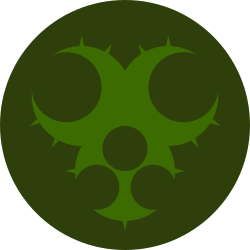
Doom is the Aspect of fate and constraint. Doom has burdens and limitations; Doom concerns itself with practical issues instead of lofty ideals. Doom sees no escape or negotiation, going with what others demand of you.
Doom is represented by skulls, death, and fire.
Doom is opposed to the Aspect of Life.
The practical matters and the knowledge of our limits leads to the endless toil of Blood. The interplay of Life and Doom leads defining one's self in Heart or hiding in Mind.
Breath

Breath is the Aspect of detachment. Breath goes with the flow, not caring about anything or anyone in particular; Breath does whatever feels right in the moment, not worrying about much.
Breath is represented by wind, leaves, and rivers.
Breath is opposed to the Aspect of Blood.
The freedom of exploration of and detachment of goals leads to the compromise and negotiation of Hope and to exploration of the self in Heart.
Blood

Blood is the Aspect of effort. Blood has lofty expectations, from both itself and others, and runs itself ragged to accomplish all of them. Blood cares intensely about what it does, without rest or thought.
Blood is represented by blood, sweat, stone, and iron.
Blood is opposed to the Aspect of Breath.
The exertion and toil of Blood eventually lead either to hiding in Mind or to the revolution of Rage.
Heart

Heart is the Aspect of self and emotion. Heart is a person's identity and definition, their emotions and their friendships and their biases. Heart goes with its gut. Heart cares about what its heart directs it to.
Heart is represented by music, hats, and horses.
Heart is opposed to the Aspect of Mind.
Heart’s loyalty and instinct lead to the upheaval of Rage and Heart’s caring nature leads to Blood.
Mind

Mind is the Aspect of thought and masking. Mind coldly adapts itself to circumstance, hiding the true self in order to blend in with what's acceptable. Mind is impartial. Mind weighs all the options, and picks the one most suited to the situation.
Mind is represented by masks, blindfolds, and scales.
Mind is opposed to the Aspect of Heart.
Mind’s bottling of emotions leads to the real detachment of Breath; and Mind’s adaptive nature leads to Hope.
Rage

Rage is the Aspect of rebellion. Rage is skeptical of what society presents as true, and fights tooth and nail for what it stands for. Rage riots and fights back; Rage would sooner bring revenge than healing. Rage fights for sudden change.
Rage is represented by fangs, beasts, and waves.
Rage is opposed to the Aspect of Hope.
In fighting against their shackles, one gains the newfound options of Life. Rage’s sudden changes forms half of the past events of Time.
Hope
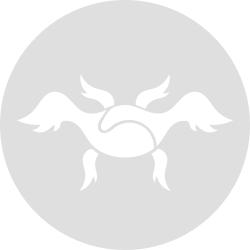
Hope is the Aspect of diplomacy. Hope believes everyone is good at heart, and that everything could be solved if only everyone talked things out. Hope has blind faith and will sooner comfort a friend than hurt an enemy. Hope solves things slowly and steadily.
Hope is represented by religion, ribbons, and blankets.
Hope is opposed to the Aspect of Rage.
Hope’s compromises and negotiations lead to new shackles in the form of Doom. Hope’s slow changes form half the past events of Time.
Time

Time is the Aspect of the past. Time is concerned with traditions, patterns, and the inevitability of what came before. Time brings the authority of established rules and governance. Time looks to what was to decide what will come about.
Time is associated with gears, crowns, sand, and clocks.
Time is the color of a gear turning to rust, of blood leaving a vein, of a game timer running out. Time powers shine in all colors at once before they settle on one.
Time is opposed to the Aspect of Space.
The knowledge of the established patterns of Time leads to the knowledge and definition of Light.
Light

Light is the Aspect of definition. Light has clear rules, clear definitions, and clear answers. Light creates frameworks of understanding and puts things in black and white, right and wrong, relevant and irrelevant, which can sometimes lead to ignoring the gray areas between. Light is the Aspect of human knowledge of the world, our ideas, stories, and sciences.
Light is represented by the sun, fire, and compasses.
Light is the blazing color of the sun, impossible to look at for long, but shining its light everywhere, a white light that returns as a myriad of colors.
Light is opposed to the Aspect of Void.
The sharp delineations of Light ignore the gray areas outside definition, creating Void.
#homestuck#homestuck analysis#homestuck aspects#homestuck classpects#space aspect#void aspect#life aspect#doom aspect#breath aspect#mind aspect#rage aspect#hope aspect#time aspect#light aspect
460 notes
·
View notes
Text
Breath as Influence and John in the Epilogues
Breath is probably one of the better understood aspects. “What is it?” someone asks – and the whole fandom is like, “Oh, Breath is about freedom and wind and detachment.” Which I don't disagree with. But I think most people miss a key piece of it – Breath as influence.
I'm no seasoned classpector, but I am a Mage of Breath, so I feel like I have a deep and personal understanding of Breath, particularly because of how it has manifested in my life. Yeah, I know, claiming I'm an authority on the subject because of my self-imposed alignment within a fake typology system makes me sound like an asshole. But I'll have to ask you to trust me, because if I start talking about my own experiences, I'll sound like even more of an asshole.
Anyway, let's kick this off with the official description of Breath, per the Extended Zodiac:
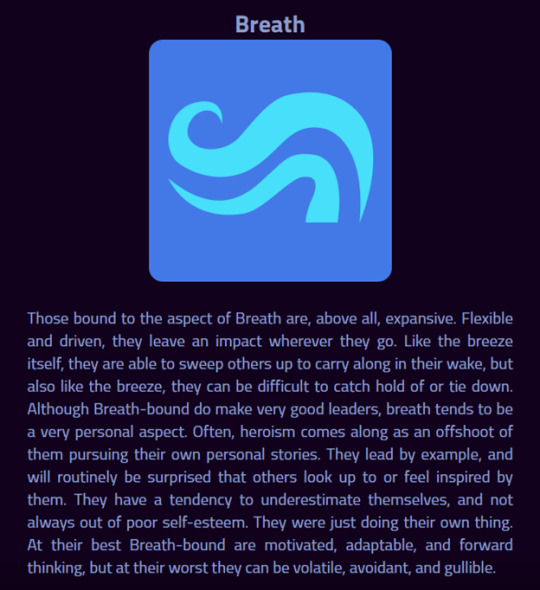
In summary: the Breath-bound are flexible, driven, detached, and maybe a little self-centered. Also, other people tend to get caught up in their personal development, which tends to make them good leaders. But the most important thing here for the point I'm making is this:
others ... feel inspired by them.
This word, inspired, has been rolling around in my brain for the past few weeks, because of its connection to Breath. Hey, did you know that “inspire” comes from Latin spirare, meaning "breathe"? And if we include the Latin prefix in-, it becomes "breathe into."
The Breath-bound have an ability to breathe into, or inspire others. They're not aware of it – after all, they are just living their lives for themselves. But wherever they go, they are inspiring people. Or, more accurately, they are influencing people. Actually, the influence of Breath goes beyond just people. I could even get meta with it (and I will. I apologize in advance). But let's start small for now.
Tavros Nitram
So, Tavros. Page of Breath. Pretty much all of Tavros's contributions to Homestuck as a story happen as a result of someone doing something to him. Vriska paralyzes him, which kickstarts the whole FLARP cycle of revenge arc. And again when the truce is broken in Act 5 Act 2, it is because Vriska kills Tavros. If this doesn't sound like influence to you, you're right. Tavros has very little influence. He's a Page, after all, and if there's one thing I know about Pages, it's that they're weak as shit until they reach their "true potential," which is pretty much always something stupidly overpowered. Y'know, like Jake overpowering Jade's first guardian powers. That was pretty batshit, I'd say.
But Tavros's contributions don't end there. He actually does reach his true Page-y potential right at the very end of Homestuck, when he gathers an army of ghosts – honestly, probably every single ghost in the furthest ring – by just talking to them. Was this something of a punchline to a very long joke? Probably. But it is also a pretty good example of the kinds of things Breath players typically do.
On a meta level, though, this argument kind of falls apart, because... As far as I can tell, the army of ghosts doesn't really do anything. Nothing important, anyway. Lord English's defeat is pretty much entirely at the hands of John, Dave, Davepetasprite^2, and alt!Calliope in the body of Jade, as described in the Epilogues. The ghost army just isn't relevant, in the end.
But you know what is relevant? Vriska.
Half the people reading this just groaned, I can feel it. Why are we talking about Vriska, a Light player, on a post about Breath?? I hear your question and I raise you this: Why the fuck is Vriska so obsessed with Breath players???? Personally, I think it's because she has an innate sense for their passive ability to decide what's relevant.
But before we get into Vriska, let's talk about John.
John Egbert
John, Heir of Breath. The protagonist of the story. In the context of my thesis of "Breath as influence," isn't it interesting that the protagonist is a hero of Breath? And even beyond that, he's an Heir, a class typically interpreted as "becoming" their Aspect, or "inheriting" it. If you find my argument compelling, you could even say John is the influence that drives the story. Which is exactly what a protagonist does - after all, what is a story without a protagonist?
This question is actually addressed in Homestuck, kind of. At some point in Act 4, Terezi manipulates John into visiting his denizen early, which gets him killed. The story is left without its protagonist, and progress grinds to a screeching halt. Jade doesn't enter the Medium and presumably dies. The reckoning never happens. Dave and Rose are trapped in a doomed timeline. They lose contact with the trolls. For what is a world without the breeze, without air, but a place of complete standstill? The story needs John to continue. Okay, it needs Rose and Dave and Jade just as much. But it's interesting that the story makes a point of John's death being the turning point that makes this particular timeline doomed.
Okay, sorry for the wait. It’s Vriska time. Vriska's driving motivation is to be relevant. She does everything in her power to steal the spotlight, which may or may not be related to the fact that she's a Thief of Light. Again, I'm not an experienced classpecter. I only really have a surface level understanding of Light. But I'm getting off topic here.
In Act 5 Act 2, Vriska starts talking to John. Why? Well, partially because she wants to compete with Terezi, who is talking to Dave. But there's also the fact that she wants to be the force responsible for Bec Noir. And also for John reaching god tier. And everything relevant really??? She's really fucking good at being relevant, I'll give her that. Or at least presenting the illusion of relevance, but that's a big topic that I think I should save for another day. Another essay, maybe. The point here is, John has a tremendous amount of influence over Things That Happen just by existing, and Vriska knows it. Maybe she torments Tavros because she senses the same sort of potential in him, but that's probably a stretch.
In any case, this is baby shit. There's better evidence than this. Let’s talk retcon powers.
You could argue that the retcon powers are separate from John's abilities related to his classpect, and on some level you'd be right. But in a game that "knows" everything that is going to happen, I have to question if extraneous powers like this are taken into consideration when Sburb "decides" what classpect it gives a player. I feel similarly about Jade's First Guardian powers. Teleportation is a pretty space-y power, in my opinion. And definitely one that... "breaks rules," I guess. Among all the other things First Guardians get to do. Once again, I'm no classpector. But Jade getting access to First Guardian powers upon reaching God Tier strikes me as very Witch of Space-y. I feel similarly about John's retcon powers - they strike me as very Heir of Breath-y.
And not just because I view Breath as influence, though that is definitely the most obvious way the retcon powers could be interpreted as Breath-y. Even on a surface level, they're pretty Breath-y. When John first talks to Roxy, he gives a whole spiel about everything he's been to up until this point, most of which is obscured by "blah blah blah." But little phrases come through occasionally, and when he starts talking about his brand new retcon powers, he uses the phrase "UNSTUCK FROM CANON." Which sounds a lot to me like "freedom from the narrative." But maybe more telling is the fact that John's quest as an Heir of Breath requires that he use his retcon powers. Getting rid of the oil, freeing the fireflies - his quest as established at the very beginning was always intended (in universe at least; I can't speak for Hussie's intentions) to be solved by his retcon powers.
So retcon powers are at the very least Breath-adjacent. What’s that got to do with Breath as influence? I’m sure you see where I’m going with this. Retcon powers are basically the ability to do whatever the fuck you want to any point of any timeline. I’d call this influence but I’d sound silly, actually. It goes way beyond influence. It’s way less subtle. I guess you could call direct intervention like this influence at its most powerful. Well, almost. There’s one step above this that John never really taps into. Which brings us to...
The Epilogues
For better or for worse, I fucking love the Epilogues. I think Candy, on its own, is a fantastic and surreal deep dive into a mind high on depression. And as for Meat, I’m an absolute sucker for metafiction and narrative fuckery. I eat that shit right up. My favorite anime is Princess Tutu, etc., etc. This is your warning: Yes, this section will contain evidence toward my claim that Breath is influence. It also doubles as an Epilogues analysis. It kind of turns into one at the end. Sorry, but I needed to get it out of my system.
So, in case you missed it, the step above retcon powers that John never taps into is direct narrative control, like we see Dirk engaging in throughout the Meat side of the Epilogues. The fact that Dirk is revealed to be the narrator of Meat begs the question: who is narrating Candy? It’s never outright stated, but it’s probably alt!Calliope. Unlike Dirk, alt!Calliope doesn’t have an agenda, as far as we’re aware. So why is Candy so fucked up and weird? Why is everyone out of character? I know this comes as a shock, but: it’s probably John’s passive influence over the narrative.
Before the Epilogues even begin, John’s been wasting away in his house all day, every day. He’s depressed as hell. Sort of dissatisfied with how artificial and "perfect" Earth C is. Some have suggested he also feels disconnected from the post-retcon versions of his friends, and I think this holds some merit. It would explain why he feels disconnected from reality in Candy.

(Candy, 11)
Depression colors your view of reality. It darkens some parts, brightens others. People who look happy will appear so to an unsettling degree. Fucked up things will appear even more fucked up. Depression ups the contrast, if you will. And that’s pretty much what happens in Candy. Jane’s pretty bad in Meat, but she’s like a billion times worse in Candy. Jade causes some awkward moments in Meat, but she is pretty much a sex pest in Candy. The positive parallels are a bit harder to find, since Meat pretty much sucks too, but you could speculate that John perceives Rosemary to be happier together than they actually are, so they’re, like, uber happy together in Candy and raising a daughter and shit. It is John’s warped perception of reality that in turn warps it beyond recognition.
This isn’t just me theorizing, by the way. There’s pretty compelling evidence to suggest that this idea is accurate to what is happening. It’s pretty clear in a conversation between (Vriska), who has just arrived on Earth C via the black hole in the furthest ring and her descendant/clone Vriska (aka Vrissy in HS:BC). The two of them stare up at the sky, pointing out clouds and what they are shaped like, when (Vriska) has a realization.
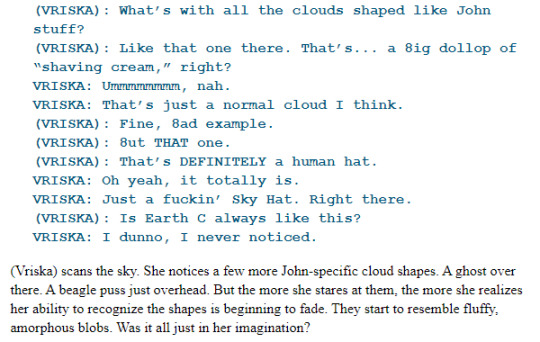
(Candy, 37)
John’s influence over the reality is so absolute, even the clouds bend to his will. I think Vriska only notices it because she’s a new arrival to Johntown. It isn’t long before she’s absorbed into the John-ness of the timeline. And then, she goes on to say exactly what I’ve been saying this whole time. Remember earlier, when I said Vriska knew that John had an incredible amount of influence over Things That Happen?
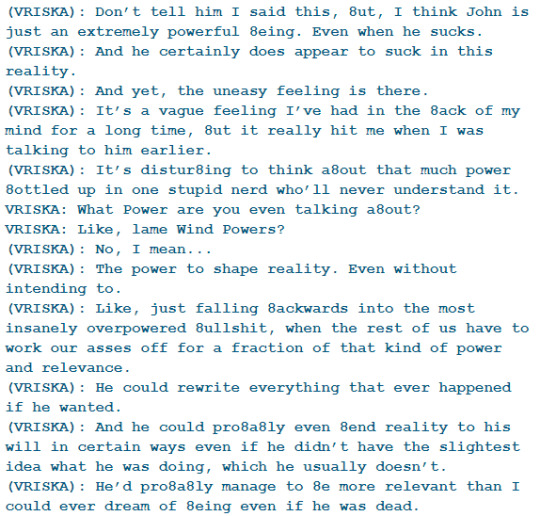
(Candy, 37)
Yeah. That wasn’t speculation.
The last thing she says, though, that he’d be relevant even if he was dead, is actually a reference to Meat. So let’s talk about it!
As we know, Meat is narrated by Dirk. Dirk’s narrative style is a lot of fun for me, personally. He’s sassy, kind of an asshole, and has no time for bullshit. The second John puts that meat in his mouth, he gets to work, pulling the strings of his little puppet show.

(Meat, 1)
He wastes no time putting words in John’s mouth, writing him out of the story of Earth C as quickly as possible. It’s almost with a sense of urgency that he pushes John to complete his mission. Which is probably necessary, seeing as the sanctity of canon relies on him going back to tie up the loose end that is Lord English. But I think Dirk has ulterior motives. I don’t think Dirk has the ability to impose his will so overbearingly with John around, because for some reason, John’s power of passive influence prevents him from doing so. Is John more powerful than Dirk, even after his ascension to Ultimate Selfhood? Maybe. I certainly think so.
But John’s pretty gullible. He’s easily influenced. He doesn’t have the same safeguard around his own mind, for some reason. Or maybe he does, and it’s just taken Dirk this long to crack him? This is speculation at this point. Not important.
So Dirk eventually kills John. Why? Well, first of all, it’s harder to control the narrative with him around. Though I speculate that’s not very important to Dirk anymore since he fucks off to who knows where around when John comes back. I think, more likely, Dirk finds John’s influence on the narrative unsavory. I mean, just look at Candy. What an absolute disaster of a timeline. Maybe his awareness is such that he knows that letting John live will result in a similar degradation of his friends’ personalities as he knows them. I can’t really say one way or another. It’d explain why he wants John’s body on the ship with him, though. Y’know, to make sure he never gets revived. And yes, he wants him on that ship. He pretty much tells Terezi outright to captchalogue his body before convincing her to join him.

(Meat, 35)
There’s one problem, though. I don’t think John being dead even erased his influence on the narrative?
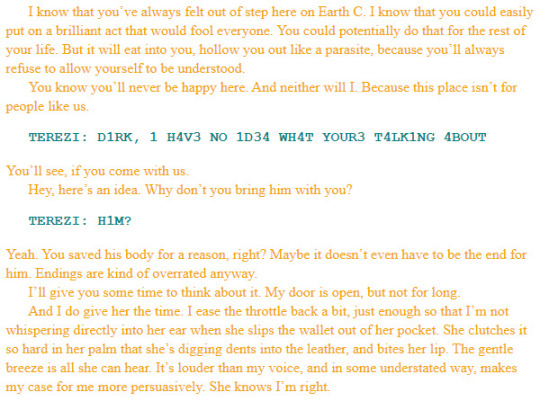
(Meat, 36)
Right there at the end:
The gentle breeze is all she can hear. It’s louder than my voice, and in some understated way, makes my case for me more persuasively.
I don’t think there’s any other way to read this than the breeze representing John. This is a literal manifestation of John’s influence. I guess it could be symbolic – like Terezi doing a “what would John do?” kind of thought process. But I dunno, Dirk doesn’t strike me as that kind of narrator. Besides... It’s a little too on the nose. Say what you will about the Epilogues, but I believe a great amount of care went into them. This certainly isn’t a throwaway line.
Conclusion
Okay, sorry. I really went off the deep end into Epilogues Analysis Land there. You may have noticed that I didn’t talk about Homestuck: Beyond Canon. That’s partly because I haven’t gotten there in my reread, but mostly because I’m not yet convinced that it has – or will have – nearly the level of plot consistency of its predecessors. We’ll see, I guess.
In any case... Breath as influence, huh? There’s probably more evidence for this hidden away somewhere. I probably could have talked about Rufioh. I didn’t want to though. I also probably could have pointed out the word inspire from the Extended Zodiac thing and called it a day, but instead I blacked out and wrote this. Weird!
If you read all, uh... *checks word count* 2.7k words of this??? Jesus fuck. If you read all this, thank you for reading. I’m open to feedback! I’d love to discuss some of this more! Especially the Epilogues stuff. I have a million thoughts. Bye!
#homestuck#homestuck epilogues#john egbert#tavros nitram#dirk strider#vriska serket#homestuck analysis#homestuck meta#classpect#classpect analysis#breath aspect#mine#will i ever write that vriska essay? the world may never know#thx yall
145 notes
·
View notes
Note
what are some common character misconceptions that you often see get thrown around in the fandom?
#homestuck#homestuck meta#homestuck analysis#homestuck fandom#homestuck polls#alpha trolls#alpha kids#beta trolls#beta kids#the exiles#nekro.sms
292 notes
·
View notes
Text
i think a lot about how homestuck characters typing quirks are put to voice. and obviously the comic itself characterizes them in such a way that specific vocals make sense, but its really interesting to see how that translates and stuff.
some of it is really obvious, like how anyone reading the comic decides how karkat shouts or how tavros sounds anxious or sollux's lisp. but then theres stuff thats a lot less obvious, but still makes perfect sense in context. like how equius tends to put STRONG (heh) emphasis on words like strong, sure, but also words with the "oo" sound. and ive noticed most people who read through the comic the first time do put emphasis there.
and some of it is more subtle, but ive never heard anyone decide terezi has a 'normal' voice. theres always some vocal distortion, maybe with fry or a nasal sound or trills, but its just one of those things. and obviously eridan has the octopimp stutter thing, but people at least always decide he kind of sounds like an asshole. sometimes its british, sometimes its like northeastern american, but always its snide as fuck.
and vriska always has a lilt, and kanaya is always a little stilted and almost always british. people try to make aradia sound spooky, they give nepeta a catgirl voice. if people know about juggalo culture, theyll give gamzee an icp style voice, if not, hell sound like a stoner or a clown.
i think the only one of the trolls that isnt really consistent is like... feferi. sometimes shes british, sometimes shes a toned down nepeta. popular fanon kind of has a way she sounds, but even that is subject to change.
#homestuck#homestuck meta#beta trolls#im not tagging them all sorry.#homestuck analysis#obviously the kids all also have written voice but its expressed a lot less obviously than the trolls in most cases.#unless youre early-act roxy or youre jake. in which case it is. exceedingly obvious.#the dancestors and cherubs also have voice of course. the most obvious i think being kankri and mituna out of the dancestors.
183 notes
·
View notes
Text
god i fucking hate how much the homestuck fandom waters down characters. hussie did such an amazing job at giving us a collection of multifaceted and nuance-rich characters to really become invested in, and so much of the fandom insists on molding them into a one-dimensional husk of themselves that only reflects the traits they can use to fulfill a trope of some sort, especially female characters. and so often this leads to people horribly misunderstanding so much of the story due to blinding themselves to why somebody could be doing something, either demonizing or angelicizing characters that are actually morally grey, or even the opposite alignment of what the fandom assigned them. this is represented perfectly in the "which troll was the worst" argument, where people almost always respond with gamzee, eridan, or vriska. while I don't believe any of the three were entirely innocent, i don't believe any of them were entirely in the wrong, either. for gamzee, so many of the things people point to in order to make their argument of him being awful or irredeemable were while he wasn't fully capable of properly vetting his decisions, e.g. sopor withdrawal. eridan is definitely less defendable than gamzee, as all of his actions were done in his right mind, but we do have to step back and look at the bigger picture. not only was he a young teenager living under a series of extremely traumatic events, he had lived his whole life having violence drilled into his head because of the lifestyle he had to live and the influence he took from Dualscar. i feel like these factors more heavily influenced his personality, and eventually his violent outburst, more than people give him credit for. after all, i feel like it's obvious that he would've turned out significantly less bitter and violent if he had been raised with more nurture. especially since feferi, a troll of a caste even more known for violence than eridan's, was significantly kinder. vriska, by far the most controversial of the three, was at least partially a product of spidermom's influence. she had no choice but to feed her lusus, of course, so what choice did she have but to become accustom to murder? coupled with the fact that manipulativeness is a trait her caste is nearly universally predisposed to, we can't have expected much from her in terms of kindness to others. now, none of this is to say any of these characters are entirely innocent, they most certainly are not. their flaws are obvious to anyone who's read the comic, so i won't touch them, but labeling any of them as simply "guilty" or "innocent" is a harsh disrespect to hussie's ability to create characters with depth and humanity. no one troll is entirely evil or entirely good, they all have flaws and redeeming traits that give them a truly life-like feel, which makes me believe that asking which troll is objectively the worst is reductionary at best and truly a crime against the masterpiece of literature that is Homestuck.
#holy shit this wasn't supposed to be this long#homestuck#homestuck fandom#homestuck analysis#gamzee makara#homestuck gamzee#eridan ampora#homestuck eridan#vriska serket#homestuck vriska#this is mostly applicable to the oldgen fandom but current fans aren't innocent of it either
146 notes
·
View notes